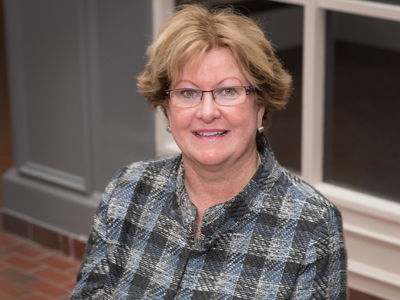As an advocate for literacy, Elaine Austin faces a daily conundrum. How do you reach your target audience without relying on the written word? “By far, this is one of our biggest challenges. If you cannot read a flyer that is posted in the local library, arena, grocery store or hospital, there is no benefit to publishing one,” says Austin, executive director of the Literacy Council of Burlington.
This catch-22 constantly surfaces, as Austin has discovered in her short time at the helm of the non-profit organization. While travelling by plane recently she noticed at the bottom of the emergency procedures pamphlet a sentence that said: “If you can't read this, ask a flight attendant for instruction.” How would one who can't read know what to do in such a dire situation, she thought? In such a scenario not knowing how to read becomes a dangerous deficit. It drove home the professional predicament she faces daily. Struggles with literacy and numeracy certainly limit one's prospects, interactions and access to information, employment and entertainment.
Shockingly, 48 per cent of all Canadian adults have low levels of literacy, which means they have trouble reading food and drug labels, writing a cheque, or completing a job application. In Ontario, 42 per cent of adults do not have the literacy skills they need for home, work and life, according to Community Literacy of Ontario, of which Burlington is a member. The inability to read and do simple math makes employment challenging and that has an impact on family life, the social fabric and the economy, adds the provincial support network.
While there's currently no waiting list of students at the Literacy Council of Burlington, Austin says that may be due to people not knowing about the service. Partner agencies such as the YMCA, The Centre for Skills Training, Halton's public and Catholic school boards, or Employment Halton often make referrals. Austin also relies on word-of-mouth to reach those in need.
Funding is also an issue to grapple with, says Austin. The Ministry of Training, Colleges and Universities kicks in money every year, but fundraising is vital to supplement the shortfalls at the Upper Canada Place offices, at James and Brant streets in Burlington.
The payoff makes donating definitely worth it, according to the Canadian Literacy and Learning Network, a national research, information and knowledge exchange. A one per cent increase in the literacy rate across the country would generate $18 billion more in economic growth yearly, and investments in literacy programming have a 241 per cent return on investment, claims the national network.
At the local council, donations for the free one-on-one and classroom services cover the costs of materials such as pens, paper, workbooks and computers. “We always find a way to keep our doors open and I am always looking and asking for financial donations or stationary supplies (paper, envelopes, printers, stamps),” says the ever-resourceful Austin. It has been this way since day one, when Austin started the job in August 2014. Oddly, one of the most “desperate” needs at that time was a vacuum cleaner. She got one after a fortuitous conversation in a grocery store where she bumped into one of the council's volunteer board members. She asked him if he knew of anyone who had a spare they'd be willing to donate. “The next day one showed up, still in the box,” she says.
The council's 50 to 60 literacy volunteers demonstrate the same generosity during weekly two-hour sessions. “Our agency could not function without our volunteers ““ they are the heart and soul of our organization.” She credits “their tenacity, dedication, unwavering commitment, time and support” for helping learners achieve their goals and enriching their quality of life, adds Austin. The majority of volunteers stay with the organization a minimum of two years and some have stayed on for more than a decade, she adds.
It takes two days of training and $20 for the annual membership, plus a police check, to become a certified Laubach Literacy Ontario volunteer at the Burlington council.
While Austin says there's no “typical” student, learners are usually between ages 19 to 72 and want to upgrade their reading, writing and math skills, to improve their job opportunities, further their education, or just meet their daily literacy needs.
“Each of them has a special story to tell that hopefully will cause a ripple effect on us all,” adds Austin.
For more information contact: literacycouncil.ca
